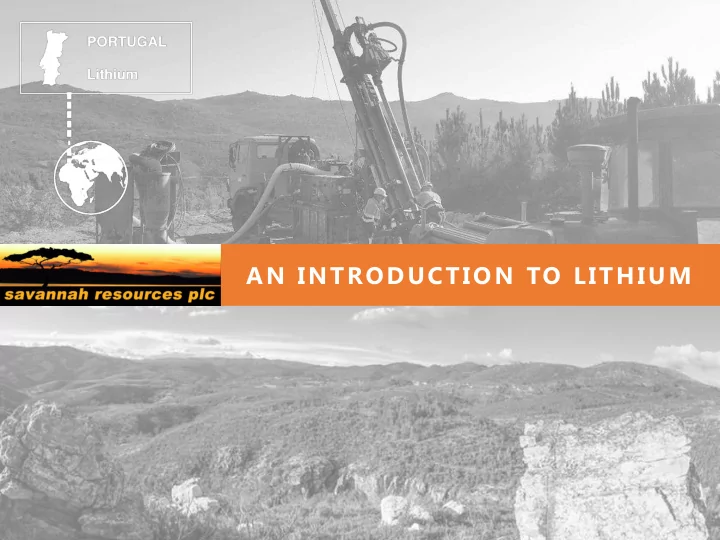

AN INTRODUCTION TO LITHIUM
Lithium: what is it? 2 Lithium is a soft silvery-white metal • which is highly reactive and does not occur in nature in its elemental form In nature it occurs as compounds • within hard rock deposits and salt brines Lithium and its chemical • compounds have a wide range of industrial applications resulting in numerous chemical and technical uses Lithium also has the highest • electrochemical potential of all metals These properties provide very high • energy and power densities for Lithium ingots with a thin layer batteries, for long useful life in small of black nitride tarnish and comparatively lightweight packages, that is also driving growth in demand
Where does lithium come from? 3 Lithium has two major sources: • hard rock and brines. Savannah’s projects are hard rock in origin so only that source is described In the case of hard rock lithium, it is • primarily sourced from pegmatites, which are essentially granite-like rocks that are distinguished from other granite rocks by their extremely coarse but variable grain size Lithium bearing pegmatites are a • Spodumene is the primary lithium subset of granitic pegmatites that are associated with certain granites mineral present at Savannah’s Portugal Lithium projects Pegmatites consist mostly of • quartz, potassium feldspar, albite, and muscovite and the major lithium ore minerals are spodumene, petalite, and lepidolite
Lithium uses 4 Lithium and its chemical compounds exhibit a broad range of beneficial • properties including: The highest electrochemical potential of all metals o An extremely high co-efficient of thermal expansion o Fluxing and catalytic characteristics o Acting as a viscosity modifier in glass melts o Low density o Low atomic mass o As a result, lithium is used in numerous applications which can be • divided into two broad categories: CHEMICAL APPLICATIONS TECHNICAL APPLICATIONS
Lithium uses: technical and chemical 5 TECHNICAL APPLICATIONS CHEMICAL APPLICATIONS ESTABLISHED USES THE FASTEST GROWING MARKET Lithium products are used directly From concentrates, lithium can in some technical applications, then be processed further to form when they are concentrated to a variety of chemicals, including around 5% and sold directly, lithium carbonate, lithium mostly for use in glass and bromide, lithium chloride, butyl ceramics, the current largest lithium and lithium hydroxide. The global market for lithium. These fastest growing (and second- products generally require lithium largest) market for lithium globally with low iron concentration to is for use in batteries meet end-user requirements
Lithium uses 6 CURENT APPLICATIONS NEW MARKETS
Lithium batteries 7
Lithium quantities used in various industries 8
Why lithium is so important 9 Scientists have concluded that most of the observed global warming is very likely due • to the burning of coal, oil, and gas – in order to tackle the issue of global warming we must quickly move away from the use of hydrocarbons and use cleaner sources of energy in an effort to reduce our carbon footprint Fossil fuels like oil are running out, governments and consumers are demanding • cleaner and new sources of energy and new sources of power like batteries are now coming into play Michael Gove, the UK Environment Secretary, has warned that Britain "can't carry on" • with petrol and diesel cars because of the damage that they are doing to people's health and the planet: "There is no alternative to embracing new technology," he said Britain is to ban all new petrol and diesel cars and vans from 2040 amid fears that rising • levels of nitrogen oxide pose a major risk to public health … and so demand on lithium is expected to rise: Analysts predict that rechargeable lithium-ion batteries have the highest potential for • future energy storage systems Lithium-ion batteries are being used in the electric cars and hybrid cars of the future • Lithium converts chemical energy into electrical energy very efficiently, and lithium-ion • batteries are lighter than previous battery technology and hold a charge a lot longer
www.savannahresources.com For further information on our operations or Savannah’s corporate social responsibility programme, please email: community@savannahresources.com
Recommend
More recommend